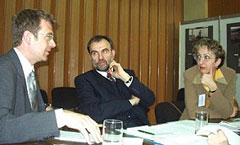Implementing Agency
BalkanKult offers a new programme...
Re-establishing and re-vitalizing trans-border artistic and cultural ties in SEE are not only important for the improving of cultural life or as concrete support of cultural diversity. It is, as well, a precondition for reconciliation, for the return of mutual trust and for moral and economic reconstruction of the region. In this respect, the strengthening of cultural cooperation within Euroregions in South East Europe, their interconnection and connection to other Euroregions in Europe would definitely make a significant contribution to transborder cooperation and openness of the borders in the entire territory of SEE. /see below/
BalkanKult is the only regional association whose main task is to collect exchange and redistribute data concerning cultural life and to initiate mobility of information, people, expertise and cultural production within SEE as well as performing research and publishing activities. It therefore seems natural that many representatives of Euroregions in SEE have suggested that implementing an agency for cultural cooperation should be established within BalkanKult. www.balkankult.org
Background
Euroregions in SEE are now in the process of shaping concrete programmes and projects, establishing cooperation with the Euroregions in other parts of Europe, as well as with international institutions and associations. In this context, it is imperative to establish a constant flow of information. Without question, the success of transborder cultural cooperation will depend on being well-informed, as well as on the frequency of meetings of professionals and artists, on educational programmes, etc.
The conclusions of all previous meetings on transborder cooperation in Euroregions in SEE stress the need to establish an implementing agency for cultural cooperation in the Euroregions in SEE. This idea has also been supported by regional and European experts. letters of support
In this respect I will really and truly support the latest BalkanKult project – initiative, because I personally think that this Organization is able to implement it and obtain the best results in the region in order to increase the artistic and cultural impact on life, with respect to the future of this region. (Arben Papadhopulli, Ruga me Pisha Foundation)
Description of the Project
The Tasks of the BalkanKult Implementing Agency would be to collect and distribute documents and information in connection with concrete projects, Euroregional events, cultural production in Euroregions and cultural institutions (public, private and NGO) which are directly involved in Euroregional cultural cooperation in SE Europe.
The agency would also work on initiating cultural cooperation in Euroregions in SEE by organizing expert panel discussions, training courses, seminars, exchange of experts, study trips, job-shadowing programmes, etc.At the moment there are seven active Euroregions (triangles) in SEE: The Danube 21, the EuroBalkans, The Danube-Cris-Mures-Tisza, the South Adriatic, and the Danube-Drava-Sava, the Prespa/Ohrid and the Drina-Sava-Majevica
· Danube 21: Zaječar (Serbia and Montenegro), Kalafat (Romania) and Vidin (Bulgaria). This Euroregion was officially established on 18th January 2002.
· EuroBalkans (Nis-Sofija-Skopje): (Serbia and Montenegro, Bulgaria and Macedonia). This Euroregion was officially established on 26th October 2002.
· Danube – Cris – Mures – Tisa (DKMT): (4 counties in South-West Romania, 4 counties in Southern Hungary and the northern part of Serbia and Montenegro - Vojvodina). The Protocol on Transborder Cooperation was signed on 21st November 1997.
· The South Adriatic: Herceg Novi (Serbia and Montenegro), Dubrovnik (Croatia), Trebinje (Bosnia- Herzegovina).
· Danube – Drava – Sava: Croatia, Hungary, Bosnia - Herzegovina and three Yugoslav municipalities as observers. The Euroregion was officially established on 28th November 1998.
· Prespa/Ohrid Region of Cooperation – FYROM, Greece, Albania. The Official framework of the cooperation between these regions in respect of creating a Euroregion was set on September 2002.
· Drina-Sava-Majevica: Serbia and Montenegro – Croatia – Bosnia and Herzegovina
The Activities of the BalkanKult Implementing Agency
*Support of cultural exchange as an example of good practice for cooperation in other social and economic fields;
*Encouragement and initiation of interregional cooperation (seminars, workshops, educational programmes etc.);
*Affirmation of culture for the function of better recognition among different coexisting cultures in SEE;
*Research and publishing activity;
*Informing the wider public on cultural cooperation possibilities;
*Free flow of information;
*Support of mobility of people, ideas and expertise;
*Encouragement of the use of new information technology;
Expected results
The most important results of the BalkanKult Implementing Agency would lead to reconciliation in the SEE region and the building of trust on a long-term basis as well as the promotion of a mutual interest between artists, institutions and functions of culture which would include:
Building partnerships;
Developing transborder cooperation projects;
Developing a transparent cultural environment in SEE;
Broadening the cultural market;
Suggested Designers of the Project
The expert team which would design the working plan of the Implementing Agency would include: Dimitrije Vujadinović (BalkanKult); Ana Krstic (BalkanKult); Vladimir Pandurov (EastWest Institute Office, Nis); Janos Szabo (Budapest Observatory); Corina Raceanu (The Board for Cultural Heritage and Religion of the Timis county); Sofia Zahova (National Civil Forum for Culture, Sofia); Arben Papdhopulli, (Ruga me Pisha Foundation, Tirana); Slavko Matic (Secretariat for Education and Culture of the Autonomous Province of Vojvodina).
The suggested team of advisors and evaluators for the project would include: Prof. Dr. Andreas Wiesand (European Institute for Research on Cultural Policy and the Arts); Jens Gabbe, (Association of European Border Regions); Gunter Mudrich (Congress of Regional and Local Authorities, the Council of Europe); Peter Inkei (Budapest Observatory).
BalkanKult previous activities
EuroBalkans Culture Map - BalkanKult has recently created an on-line database of cultural institutions and functions of the EuroBalkans Euroregion in cooperaion with EastWest Institute’s office in Nis.
Cultural Tourism in the Danube-Cris-Mures-Tisza Euroregion - BalkanKult is currently working as an implementing agency on the project entitled ‘’The Developmental Aspects of Cultural Tourism in the DKMT region’’. The project is supported by the Executive Council of AP Vojvodina. The role of BalkanKult as an implementing agency is to establish and coordinate regional and international cooperation with other Euroregions and international expert institutions. As a first step, BalkanKult has organized two expert meetings: ‘’Culture tourism in the DKMT Euroregion / Museums and Archaeology: Possibilities of Cooperation’’ and ‘’Cultural Tourism in the DKMT Euroregion / Creation of Tourism as a Product’’ as well as an international conference ‘’The Developmental Aspects of Cultural Tourism in the DKMT region’’.

Museums_Programme_1.zip
Museums_List_of_participants.zip
Summary_Report1.zip

Program_turizam_eng.zip
List_of_Participants2.zip
Report1.zip
Pespa/ Ohrid round tables For EastWest Institute BalkanKult has made proposals for the organization of two round tables entitled ‘’Cultural Tourism in the Prespa/Ohrid Region: Museums and Heritage sites’’ and ‘’Cultural Tourism in the Prespa/Ohrid Region: Creation of Tourism as a Product’’.
Cities Networking
Recently, BalkanKult has started working on a very interesting project which is not based on the geographical borders but on interests in the field of culture. This project includes the cooperation between the cities of Novi Sad, Osjek and Mostar with Triangle Region in Denmark. This cooperation is proving to be a very successful model for future cooperation and networking in the West Balkans region.
Published: 2003-05-16
Updated: 2004-06-23
Document(s) for download:

